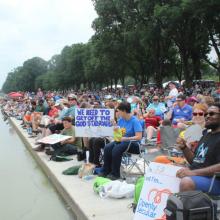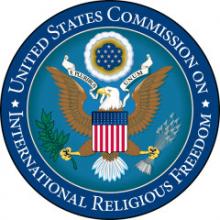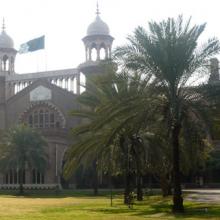Pakistan
O God of all creation, as ocean waters warm, / we grieve the devastation that comes with violent storms. / We pray for people struggling— who need your help and grace / on every flooded island and in each flooded place.
They have been the targets not only of electoral discrimination but also of vandalism against their places of worship.

Gwoeii / Shutterstock.com
WHEN YOU live as a Christian in an Islamic country, there is no room for fear, no room for anger. You have to be patient. You have to be intelligent enough to live peacefully and nonviolently.
Once I was sitting all alone in the Catholic Church compound in Toba Tek Singh, a city in the Pakistani province of Punjab. The electricity had gone off, as outages are common in Pakistan. I was sitting below a huge tree. The compound gate was open. Suddenly, I saw a delegation coming down the road, led by the Islamic clerics—a huge group of them. I stood up to welcome them. I invited them to come into the courtyard. Unfortunately, they refused. They were very aggressive.
“Close your school immediately,” they told me. “You have co-education. You are giving wrong values. We are going to bomb it.”
In the group, there was one Muslim boy. “But Maulana Sahib,” he said, “the daughter of the local Maulana comes here for physiotherapy and they (the Christians) give it free of cost.” The Maulana (Muslim cleric) didn’t know what to say. He just walked away.
The immediate threat was over—but just by chance. I went into the church and looked at the crucifix: “Thank you, Jesus, for protecting us.”
I reflected on the incident. Here I was trying to get children to school. Now there was a threat to bomb the school. If I tell the parents that a delegation has given this threat, then the parents will not send their children to school. If I keep it a secret from parents, then what will I do if the school is attacked? I said a short prayer. I put my trust in Jesus’ suffering rather than in fear of the attackers. But these choices must be made daily.
We have to have strong faith when we work in challenging areas. We have to believe in Jesus. We have to believe in the cross. Those values alone will stand us in good stead.
We must have a spirituality that says no to war, no to militarization, no to weapons. All this talk of fighting the other has to end. Unless we go down the peaceful path, there will be no end to this killing, bomb blasts, death. Instead, let us teach and promote a culture of peace.
“Why should my religion be a business of the state? If my religion is mentioned on the identity card, that makes me even more vulnerable as a minority,” said Asher Daniel, 19, a university student in Lahore and a Christian.
Masih recently filed for divorce from a husband she said “frequently beats me up” and a mother-in-law who she said burned her leg with coal.
But under the country’s laws, she must produce a witness who would testify to committing adultery with her husband. As a result, she’s now reluctantly planning to renounce her faith.
“It is a thinly-veiled reference to stereotypes about Islam and Muslims,” said Daniel Mach, director of the American Civil Liberties Union’s Program on Freedom of Religion and Belief. “This reference to honor killings is part of a broader effort to smear an entire faith by the extreme acts of a few and its inclusion in this order bolsters the argument that this is simply another attempt at a Muslim ban.”
When President Obama signed a newly strengthened international religious freedom act on Dec. 16, the intention was to protect religious believers around the world.
But the freshly signed act is being heralded by some legal scholars as a different milestone — for the first time, atheists and other nonreligious persons are explicitly named as a class protected by the law.
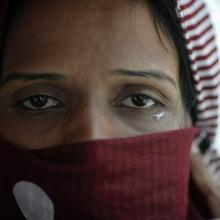
A Pakistani refugee cries as she leaves a detention center. Image via REUTERS/Damir Sagolj/RNS
Religious freedom remains under “serious and sustained assault” around the globe, according to a new annual report from the U.S. Commission on International Religious Freedom.
“At best, in most of the countries we cover, religious freedom conditions have failed to improve,” commission chairman Robert P. George said May 2.
“At worst, they have spiraled further downward.”

Photo via Dark Moon Pictures / Shutterstock
As many Christians sat down Sunday morning to celebrate Easter, a suicide bombing targeting Christians halfway across the world in Lahore, Pakistan killed 72 people and injured at least 320. Right as American Christians were shouting, “He is risen, Alleluia!” an entire city cried out in horror and mourning. As American children hunted Easter eggs, a bomb exploded into Pakistani children visiting a neighborhood park.
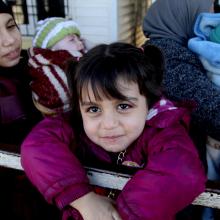
Syrian refugees who came from Aleppo waiting at the refugee camp in Essalame border gate on Turkey - Syria border in Essalame, Syria in February. gungorkarakus / Shutterstock.com
The Christian tradition calls its followers not to bear false witness. So how do we live out this calling? What does it mean not to bear false witness against Muslims in the age of ISIS? Here are three false assumptions, if not outright lies, often repeated about Muslims and terrorism, along with some facts that can help us have more honest conversations about our Muslim neighbors and about the violence we encounter in western nations.

Paul Bhatti. Image via Rosie Scammell/RNS
Paul Bhatti, a Roman Catholic, worked as a surgeon in his home country of Pakistan and in Europe, while his brother, Shahbaz, went into politics and became Pakistan’s only Christian Cabinet member as the country’s first minister of minority affairs. Then, on March 2, 2011, Shahbaz was cut down in a hail of bullets in an attack by a militant group that called him “a blasphemer.”
Saima Butt witnessed an acid attack in February 2014 that left the victim scarred and writhing in pain. One onlooker said the assault was God’s retribution, and that her death would mean one less sinner in society.
“People enjoy our agonies and treat us like insects,” Butt said of herself and of the anonymous victim.
Butt is supervisor at the Khawaja Sara Society in Lahore and a member of the local “khawaja sara” or third-gender community. Pakistan added a third-gender option to national identity cards in 2009, but official recognition has not stopped discrimination against those who choose not to be identified as either male or female.
THE SO-CALLED WAR on terror has dangerous and shifting financial front lines. Since the 9/11 attacks, a series of “anti-terrorism financing laws” have been enacted that allow the government to designate certain charities as “terrorist” organizations or as financing terror. The government can effectively shut down organizations without ever bringing criminal charges or providing evidence against them, according to the ACLU. “As a result,” it reported, “American Muslim organizations and individuals are unfairly targeted.”
In addition to fostering Islamophobia in the larger society and fear within Islamic and other faith communities, overzealous application of these laws can actually inhibit the war on terror. It risks crippling the very Islamic charities that can effectively combat radicalization in places vulnerable to extremists. Stephen Bubb, head of a charity network in Britain, where financial terror laws are similar to those in the U.S., has emphasized “sensible, credible, proportionate regulation” of Islamic charities. “I have witnessed firsthand the difficulties faced by organizations in Pakistan fighting the same battle that we are: for security, for a better way of life, and for a better future for our children,” said Bubb.
An independent religious freedom watchdog panel has welcomed the State Department’s annual religious freedom report and its list of the world’s worst offenders, which had laid dormant for three years.
The list of “countries of particular concern” had remained unchanged since 2006 — and hasn’t been formally issued by the State Department since 2011 — when Burma, China, Eritrea, Iran, North Korea, Saudi Arabia, Sudan and Uzbekistan were cited.
In April, the U.S. Commission on International Religious Freedom recommended that the list be doubled to include Turkmenistan, Tajikistan, Vietnam, Pakistan, Syria, Iraq, Nigeria, and Egypt. Turkmenistan was the only new addition to this year’s CPC list, bringing the total to nine countries.
The State Department and the independent USCIRF have often been at odds on who makes the list of worst offenders, and in a statement, USCIRF noted the “disappointing omission” of Pakistan in particular.
“Pakistan represents the worst situation in the world for religious freedom for countries not currently designated by the U.S. government as CPCs,” said USCIRF Chair Katrina Lantos Swett.
Some die for choosing, others for not choosing. But they all die because they are women. Rogers was mentally ill, and there is debate about whether it was his illness or a misogynistic culture that caused his rampage. For Farzana’s family, and for the 1000 Pakistani girls and women who die each year in the name of honor, there is no question.
As a crowd watched outside a courthouse, the family of a pregnant Pakistani woman beat her to death Tuesday because she married the man she loved instead of her cousin.
Lahore police charged her father, Mohammad Azeem, with murder, and the others were being sought. Azeem told police he helped kill his daughter because she had shamed the family.
“I killed my daughter as she had insulted all of our family by marrying a man without our consent, and I have no regret over it,” police investigator Rana Mujahid quoted him as saying.
Parveen was attacked as she and her husband, Mohammad Iqbal, arrived at the gates of the Lahore High Court. They went there to dispute charges brought by her father that Iqbal had kidnapped Parveen, who had been engaged to her cousin for several years.
One of the nation’s leading — and official — champions of religious freedom implored the Obama administration to add Pakistan and Syria to the list of nations that most egregiously violate religious rights.
Before a congressional subcommittee on Thursday Robert P. George, chairman of the U.S. Commission on International Religious Freedom, said it makes little sense that the roster compiled by the U.S. has barely changed in a decade.
The congressionally chartered commission George heads recently advocated that the State Department add eight nations to the eight already designated as “countries of particular concern.” But among the recommended additions, he singled out Pakistan and Syria for their deteriorating and troublesome records on religious liberty.
Mohammad Asghar, a 69-year-old paranoid schizophrenic, faces a death sentence in Pakistan for claiming to be the Prophet Muhammad in letters written to officials and police in 2010.
The retired British national of Pakistani descent is partially paralyzed after a stroke, but Pakistani courts have so far refused to acknowledge his physical and mental limitations.
The charges against Asghar recall the case of Rimsha Masih, a teenage girl who was alleged to have dumped torn and burnt pages of the Quran into a garbage heap nearly two years ago.
Qadeer Abbasi is recovering from a broken arm in his two-room shanty home not far from the capital, Islamabad.
On Nov. 15, Abbasi, 34, offered noontime Friday prayers at Madrassa Taleem ul Quran when the seminary was attacked by a procession of Shiite mourners. Besides the Sunni madrassa, the Shiites also struck 100 shops, four private banks, and scores of cars.
In less than an hour, 12 people were killed and intense gunfire prevented humanitarian services from ferrying the injured to hospitals.
MY HEART WAS broken when I got the news on a Sunday in September: All Saints Church in Peshawar, Pakistan, had been attacked by two suicide bombers just after the Sunday service, as worshippers filtered out of the sanctuary. Eighty-five people were killed, including 34 women, seven children, and two Muslim police officers there to provide security. Later reports said the bombers were Sunni extremists.
In 1976, I was honored to start Youth for Christ in Peshawar. There were few Christians in this area near the Afghan border; Peshawar was not and is not a big town. Undoubtedly, some of the adults in and around the church when it was bombed were people I had met decades earlier.
News of the bombing confounded my memory of Peshawar 38 years ago. Religious plurality then was not perfect, but it was in great contrast to today. Christians, though few, served the Lord with some freedom. Youth for Christ held open-air rallies in the park, amplified by public-address speakers, with young people singing Christian songs with Bible messages to be heard by anyone within earshot. No security was needed, and truth be told both Muslim and Christian youth were in the audience and the choir.
The start of the second Gulf war in 2003, and subsequent military actions, changed everything. Reports say the church bombing in Peshawar was in retaliation for U.S. drone strikes that killed innocent men, women, and children, along with suspected terrorists, in that part of Pakistan. Peshawar is strategically located on the border with Afghanistan, not far from the famous Khyber Pass and only about 125 miles from where Osama bin Laden was killed.





